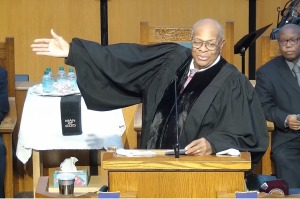Passion Week — The Most Transformative Week

We are celebrating the awesome Passion Week, the most transformative week since the world began. These eight days from Palm Sunday through Resurrection Sunday include four amazing holidays. In each of these four holidays a unique role of Jesus is celebrated and taught. In addition, on each of these four extraordinary, transformative holidays one of Jesus four main values is dynamically dramatized. What Jesus taught was lived-out on the world stage for all to see or hear, then and now.
Some prefer to call it "Holy Week," which is an excellent way of recognizing this as an intensely God-devoted week. However, I prefer "Passion Week" for two reasons. First, it is especially about Jesus Christ's passion – including both his suffering for us and also the amazing "joy set before him" in his unique role as the one Victorious Savior, Teacher, King. Second, in a very profound sense every week is holy – especially because of the work of Jesus in Passion Week. The significant events of Passion Week, in fact, are the divine factors that transform every day of every week to be "holy unto the Lord."
The original Passion Week started with a noisy parade from the Mount of Olives and into the Jerusalem Temple. A crowd of Jesus' disciples including men, women and children carpeted the road with their coats and palm branches. For the duration of the parade, that crowd repeatedly cheered loudly, "Praise to the King who comes in the Name of the Lord!" Jesus, of course, had organized this parade and accepted this preeminent praise. In fact, when he was urged by religious leaders to quiet the crowd's amazing praise, Jesus refused. Both the crowd's honest recognition and Jesus' expressions of awesome divine authority remind us of our own joyful accountability to King Jesus now in 2018.
Passion Week teaches us about Jesus, and the first Passion Lesson, taught on the first day of the week, is that Jesus is the ultimate King. And King Jesus was in charge of the remainder of Passion Week, too, including his extensive teachings, his experience of extreme torture, his endurance of four unjust trials, his horrific crucifixion, his sad death and burial, and his victorious resurrection the following Sunday! He is totally King Jesus at every nanosecond of Holy Week – and beyond.
The second major holiday of Passion Week is Command Thursday – or popularly called "Maundy Thursday," using the Latin word for "Command." The focus of the name "Maundy Thursday" is the command that Jesus repeatedly taught his disciples on this day: "Love one another." The importance of that command is huge enough, but Jesus accomplished many other goals on that day, too – including washing the disciples feet, instituting the Lord's Supper, praying earnestly for the unity of his church, predicting a personal betrayal by one apostle, foretelling a derogatory denial by another apostle, prophesying about his death, defining ultimate love as one person giving his life for others, breathing the Holy Spirit onto his disciples, teaching how to stay connected with him as branches of the the Vine, interceding for us in prayer, passionately affirming in prayer God's will and plan for his radical gift of himself, getting himself arrested, submitting to his first unjust trial, the one at the Sanhedrin, and more. What a full day Maundy Thursday was!
It takes 25% of the Gospel of John to tell the packed Maundy Thursday schedule of events – all lessons for his disciples, his students, then and now. Clearly, on Maundy Thursday, Jesus shows us himself as the ultimate Teacher – with more than a dozen major spiritual lessons based of his own awesome words and living divine example. Teacher Jesus reveals multiple vital dimensions of his sacrificial love – from washing the disciples' feet, including the feet of the ones that would soon betray and deny him, to praying so passionately that he sweats blood – all on that one Maundy Thursday.
As Palm Sunday is about King Jesus and accountability to him and Maundy Thursday is about Teacher Jesus and love from him, to him, and for one another — so Good Friday is about Savior Jesus and focuses on his achievement of divine, restorative justice. Tragically, and far too often, when we consider the meaning "justice" we think only of a fair distribution of limited goods in an economy, or we think only of the clumsy attempts at retributive justice in a so-called criminal justice system. Economic distributive justice and criminal retributive justice are irrelevant to Good Friday and Savior Jesus' version of justice.
Good Friday justice is not primarily about economic distributive justice of limited resources, because Jesus' death on the cross for us created an unlimited supply of God's amazing grace – abundant, more than enough grace to forgive all of our sin. And Good Friday is not about retributive justice for our misdeeds, because on Good Friday Jesus paid the full penalty for us all. Savior Jesus' brand of justice is tailored for covering our sin and restoring us into God's family. Restorative justice is the awesome "Good" of Good Friday. While Savior Jesus is revealed every day, the saving work of Jesus as the Pascal Lamb of God is especially public and dramatic on Good Friday.
Of course, there is one Jesus who is King Jesus, Teacher Jesus, and Savior Jesus every day – but especially revealed in those roles on different holidays of Passion Week, on Palm Sunday, Maundy Thursday, and Good Friday, respectively. He is King, Teacher, and Savior every day – but those holidays reveal Jesus as the ultimate King, best Teacher, and only Savior.
Resurrection Sunday is the supreme special day. It is totally evident that the Jesus who conquers death is surely the ultimate King, Teacher, and Savior – but now also Victorious Jesus. As the true culmination of Passion Week, now Resurrection Sunday introduces Jesus as the Triumphant King, the Overcoming Teacher, and the Conquering Savior. The Victorious Jesus' accomplishments are world transforming – and we now can faithfully affirm and trust the differences he makes in every sphere of our existence and behavior.
Perhaps the biggest challenge of Resurrection Sunday is to overcome the biases of death. In spite of Jesus' numerous prophesies foretelling his death and resurrection, his followers had not listened well and were ill-prepared for his crucifixion. Moreover, once Jesus was dead and buried, they were resistant to recognizing him alive again. A bias of death is that death always wins in the end. That is why even Jesus' most close followers were slow to recognize him even in a variety of situations [see www.MarySawHim.com], as I describe more fully elsewhere. The liberating double truth of Resurrection Sunday is that death loses and also that the Living, Victorious Jesus wins and is with us forever – as our Savior, Teacher, and King of kings.
The Living Jesus is still recognizable to all who diligently seek him. The special cultivation of awareness of Jesus is also a theme of an excellent off-Broadway musical Easter Mysteries [ www.eastermysteries.com] that will be broadcast on the NBC-TV network this Resurrection Sunday and is available elsewhere. The failure of some of Jesus followers to recognize him at first teaches us that the disciplines of awareness and vigilance are important Resurrection Sunday lessons from Teacher Jesus who is also our wonderful King Jesus, Savior Jesus, and Victorious Jesus.
Now, this chart can help for your panoramic view of Passion Week.
| Passion Week Holiday | Core Value | Jesus' Role | Our Response |
| Palm Sunday | Accountability; Authority | King Jesus | Joy in the Lord; Relationship |
| Maundy Thursday | Love (one another) | Teacher Jesus | Commitment; Community |
| Good Friday | Restorative Justice | Savior Jesus | Liberty; Gratitude |
| Resurrection Sunday | Vigilance; Awareness | Victorious Jesus | Hope; Empowerment |





























